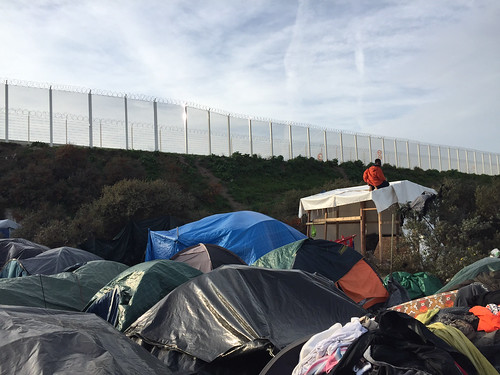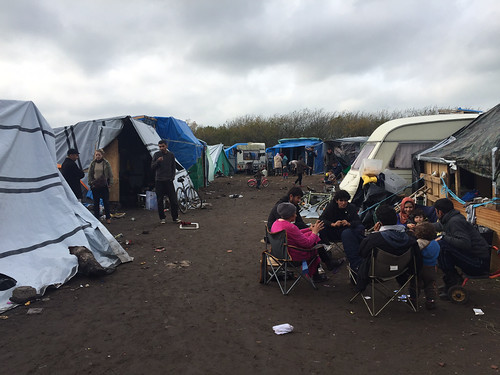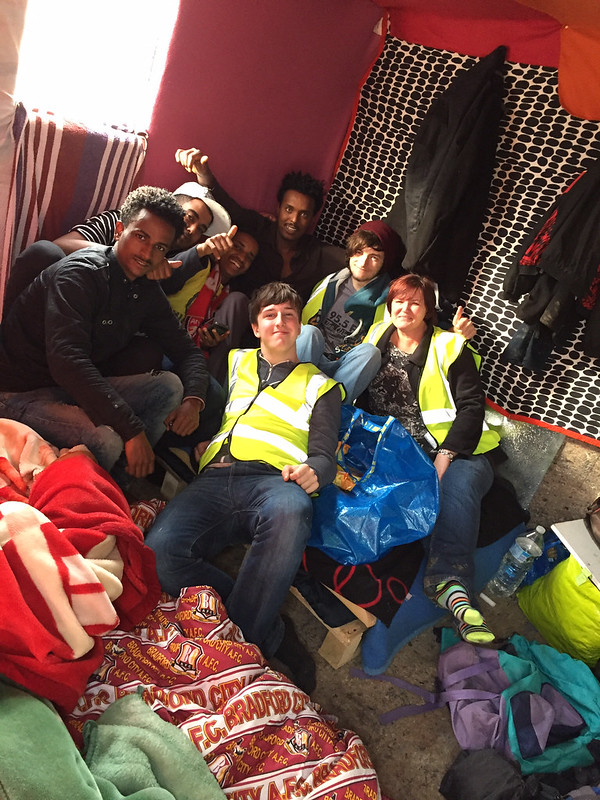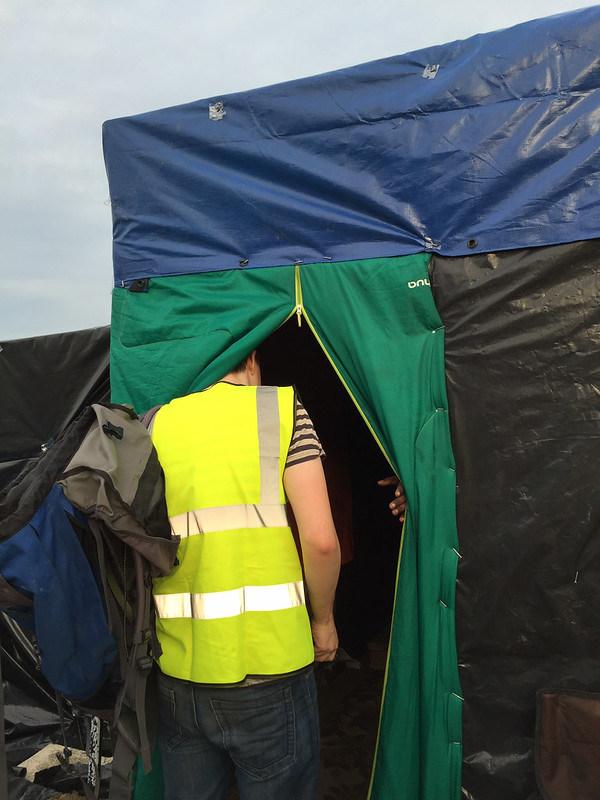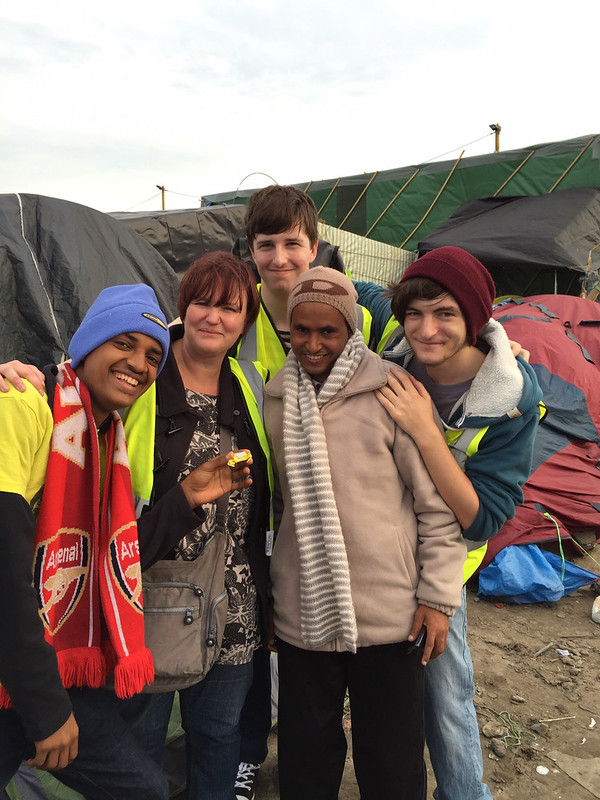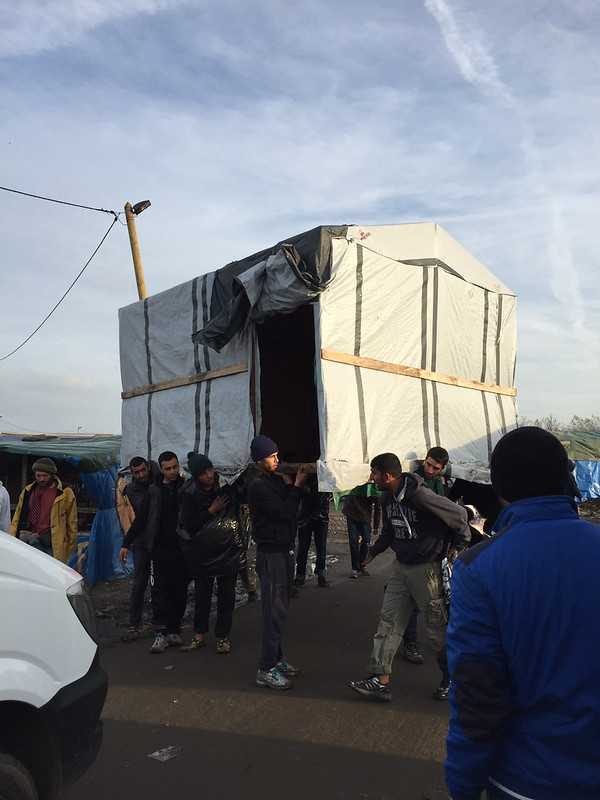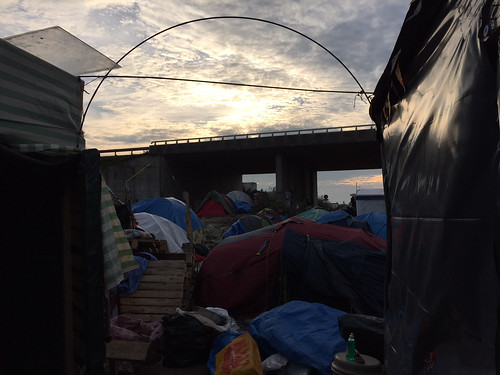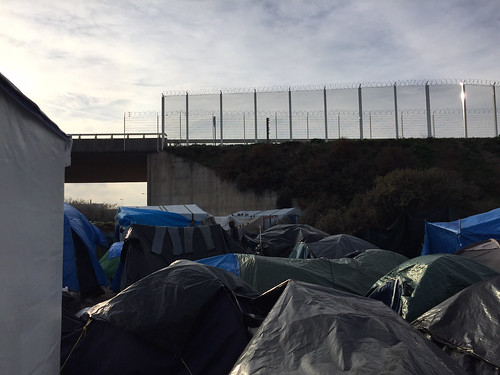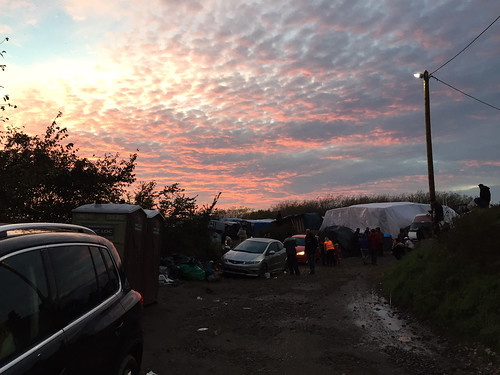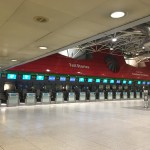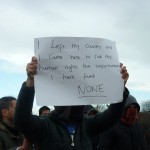I opened up my writing app to start this blog post, stared at the empty screen and didn’t know where to start. After another day spent at the Jungle, the refugee camp in Calais, I find myself feeling numb. It’s as if I’ve got to the stage where I’m so overwhelmed with emotions that I’ve become numb, unable to process what I’ve experienced. And then I think back to the men I saw sitting by the main drag, staring into space, their eyes dead, their spirits broken and I begin to understand just a tiny fraction of what it must be like to be them.
But let’s start at the beginning. This was my fourth trip to Calais with the Swindon Calais Solidarity Group. Once again we’d loaded our cars with food, clothing and treats, and a van had gone ahead to deliver coats and blankets to the distribution warehouse, to be taken to the camp at a later date. On previous visits we’d been in touch with one of the organisations on the ground, L’Auberge des Migrants, and had been allowed into the camp unhindered. Now the French authorities are trying to make life even worse for the refugees by making it difficult for volunteers to access the camp. This time each of us had to register with the organisation and on arrival we had to collect permits for our cars, to prove to the police we were there on “official” business – yet even with the permits the CRS (the French riot police) refused us entry. We had to double back and sneak into the camp another way – but we were determined to get there.
Each car had a variety of things in it and our biggest issue was transferring the boxes of food and clothing to bags for us to carry around the camp. Immediately we arrived a small crowd appeared by the cars. “Line, line,” we shouted, encouraging the refugees to line up so we could give them fleeces, donated by a local business who’d changed their uniform and wanted surplus old stock to go to a good cause. Once the fleeces had gone we tried to distribute the rest of our supplies amongst the team. “No line, no line,” we called. But it was an impossible mission, and we had to walk into the camp and wait a while before the crowd subsided enough for us to return. Even then, it was a bit of a scramble, and many of the things I’d chosen personally to give out were distributed by others volunteers, which was a bit of a shame, as I’d wanted to give out the notebooks and pens, cards, gloves myself. I did end up with plenty of supplies and at least my things would have been distr mibuted anyway. I think we need to find a new way to organise ourselves for next time though.
And so into the camp we went, first to the family section behind the church. On our first trip just six weeks ago we saw very few women and children as they were normally rounded up and taken to the nearby Jules Ferry Centre. Now, however, there are too many women and children to go there, and many have come as families and are desperate to stay together in the main camp. We talked to an Iraqi family – father, mother, sister, three children – who had only been there a short while, and gave them food, toiletries and sweets. The two little boys spotted we had footballs in our bag and were so excited at the prospect of having one each. We started pumping up one of the balls (a donation from a friend of my mum) but the bloody needle adaptor broke! I was devastated at the idea of letting down the boys but thanks to the determination of Bob, one of our lovely volunteers, we managed to pump up two of the balls just about enough to make them usable. I’ll be buying more adaptors and taking the remaining balls next time.
Whle we’d been struggling with the pump Dan (my son) had wandered off to talk to another family and I looked over to see him tucking into a plate of food! We went over to introduce ourselves and the family, who were from Iran, invited us into their home, gave us food, told us a little about their family and their life in the camp. They had very little English but we managed a conversation and thanked them for the rice and beans, which was delicious. We gave them some supplies and returned to our car to get a bottle of water for one of the girls there. These people have so little yet wanted desperately to share what they had with us. I was humbled by their generosity.
We’d already seen my “adopted” son, Ridwan, a 14-year-old from Eritrea, and we were anxious to get over to his part of the camp to visit him and his friends. Last time we saw him he was wearing clean clothes, and we’d given him more stuff. This time he was wearing different things again, and he’d asked me to bring some tshirts for him. For a moment I wondered why he needed so many clothes – and then it hit me. There are a few people – women, mostly – who you see washing clothes but for most people the lack of access to clean water or drying facilities and the wet weather means it’s impossible to get clothes clean or dry. So presumably the only alternative is to keep getting new clothes from volunteers bringing donations, and discarding the dirty smelly clothes in a rubbish pile. When you’re living in such poor conditions, knee deep in mud, it’s no wonder clothes and shoes don’t last long.
The first time we met Ridwan he was in a tent on his own; the next time his tent and possessions had been stolen and he was sharing a tent with two other guys. This time he had a different home again. Their tent had been damaged in a rainstorm and they had been given a shack built by one of the dozens of volunteers working to create structures that might survive the winter months. Built around a wooden frame, the hut has thick plastic sheeting on the outside and is lined with donated blankets and duvets on the inside. It has a proper door and even a corrugated plastic window! Measuring about eight foot square, this is home to five Eritrean guys who share the mattresses, sleeping under donated blankets and sleeping bags and even a Bradford City FC duvet! Not sure if this has been donated at an official club level but I saw several new arrivals walking around with similar duvets in bags. Nice gesture if they have … Though having looked on the main club forum for any information and see some horrific anti refugee comments, I doubt the majority of fans would be so pleased…
We were invited into Ridwan’s new home, met his housemates Abel, John, Alexander and Filimon, and chatted about their lives both in Eritrea and Calais, and their hopes for the future. After Ridwan, Abel is the next youngest, just 17 years old. He speaks very good English and he asked me if I knew what Eritrea was like and why they were in Calais. He seemed quite impressed that I knew about the military regime, where boys are enlisted into the military at 15 or 16 and then have no control over their lives at all … The military tells them where they will Iive, what they will do for a job, when they have time off, and pays them a pittance for the privilege. As Abel told us about his life in Eritrea I looked at Dan and Bob, both 18, and realised just how lucky we are in the UK to have such freedom of choice. Abel told us that even in the capital city, Asmara, there can be problems with the electricity and running water and the people there are very poor. I asked them all what they wanted to do when they reach England and they were adamant they wanted to work or study, and earn enough money to send back home to support their families. Abel wants to be a computer animator, Alexander a car mechanic, Filimon a carpenter. John was just happy to do any job he could find. No mention of benefits or scrounging – these are young men who want to have some control over their lives and earn an honest living. How can anyone deny them what we in the UK take for granted?
We gave the guys the remainder of our supplies – including some tins of ful medames beans that Ridwan had specially requested. They also had the tshirts and we gave Ridwan my old iPhone, with some credit on it, so he can contact friends via Viber, or use Facebook. They told us about the rain leaking through the roof, the coldness at night; about the heavy police presence, about the tear gas attack earlier in the week, of how the gas had seeped into their house even with the door closed. For them, this has become a way of life, and one from which there may be no escape.
We’d left our shoes outside the house and Dan discovered that his had been stolen! Bit of a catastrophe, especially as the paths are now very muddy and wet. The Eritran guys were really shocked and immediately started a search for the boots – and five minutes later they’d retrieved them from a Sudanese guy. “Eritrean people are honest, we would never steal,” Abel told me – and I believe him. They are the nicest bunch of people I’ve ever met and my heart breaks to think of them stuck at Calais. Some of them have given up on the idea of coming to the UK though they are totally stuck in the Jungle now, with no way of going home or anywhere else. Some still try to get on the channel tunnel train every night. Ridwan is now travelling every day to a place called Hazebrouck, where he tries to smuggle himself onto a truck heading for the UK. When I asked the others why they are not also doing that, they said that as adults, if they are caught they will be sent to prison. Apparently because Ridwan is so young the police will be more lenient and just send him back to Calais.
There were several other new “houses” in the camp, and I never cease to be amazed by the ingenuity that goes into the building of them. One guy was very proud of his new home, which he only moved into yesterday. The door is a sleeping bag and it zips open to allow entry. Inside, however, it was very dark, and I wouldn’t like the idea of sleeping in there st night – especially not when he was planning on using a gas stove we for warmth. But a shack is better than a tent, I guess, especially as the winter closes in.
We needed to return to the cars for more supplies but first I wanted to look for the restaurant we saw being built by a lovely trio of men a few weeks ago, and Ridwan reckoned he knew where it was. I lose my bearings easily in the Jungle, especially because every time we go there are more structures, new tents, more people. True to his word, he took us to the now completed restaurant where we were reunited with Aziz and Afredo. The third musketeer, Ibrahim, has claimed asylum in France and moved to Paris; Aziz and Afredo have decided to give up on their dreams of England and make a life in the Jungle.
The restaurant is amazing – built from old pallets and tarpaulin, it has seating all the way around the edges, a large table in the centre, a kitchen area, a shop, and sleeping quarters behind. The inside is lined with old sheets and duvet covers in an array of colours, and there’s bunting, tinsel and even a flashing disco ball hanging from the ceiling. They serve fried chicken, rice, beans, delicious spicy milk tea, shishas. Somehow powered by a generator, many of the people there were drinking tea while they waited for their phones to charge on the numerous 4-way adaptors around the room. We were welcomed warmly by our friends who remembered us, even remembered our names, gave us the guided tour, gave us tea. We promised to see if we could bring loudspeakers and SIM cards next time, and returned later for more tea and chat, including to a man from Syria who has left his family – wife and four sons – in Aleppo while he tries to find a safer place to bring them. I often struggle to make friends in the UK, people are sometimes hard to get to know, but the residents of the jungle are so friendly and welcoming, so dignified, so humble, so industrious, so ingenious. We have a lot to learn from them.
Just along the main drag from the restaurant a fight in a bar overspilled onto the path, and apparently a hammer was involved. Scary stuff – but the first example of violence between refugees that I have seen on my visits to the camp. However, tension must be very high and it’s easy to understand how such things happen.
Eventually we made it back to our car – the paths are muddy, stony, wet, hard going for someone whose commute to work is a couple of feet along the landing, and I was tiring fast. We loaded up with the last of the food plus a few hats and scarves, and went back to the Eritrean part of the camp to give food to our friends’ friends. We found a large group of young women and shared out the chocolate, fruit juice and fish amongst them. I was nearly reduced to tears by the smile on one girl’s face when I gave her a bar of chocolate, on my knees with emotion when we ran out of food and people began sharing between themselves. We spotted one young girl on her own and gave her our last pack of fruit juice. She thanked me and we held hands for a moment. She was so cold; her hands were like ice. I found a fleece scarf (I’d actually given it to Ridwan but he was already wearing the Arsenal scarf I gave him last time, and he was happy to give it up) and wrapped it round her, hugged her, told her we cared. Bob took off his hoodie and gave it to her, though she tried to refuse it.
Our final stop of the day was to visit Ibrahim, a quietly-spoken Eritrean who had shown me his beautifully-decorated tent on a previous visit. He invited us in, introduced us to his new tent mate, let us rest our weary feet. We talked about politics – he’s very aware of the British government’s rejection of the refugees in Calais, and was quite scathing about Cameron and his cronies. Then we took photos, shared handshakes and hugs with our friends, promised to keep in touch and return soon.
As we walked back towards the cars we saw a newly constructed building being moved from one part of the camp to another. It was certainly another take on the phrase “mobile home”!
We arrived back at the car and as soon as I opened the boot to put our empty bags in, two small boys jumped in and said “London!” If only we could take them with us. Instead, we had to manhandle them out and leave them behind in the Jungle while we drove back to our privileged lives in the UK.
And now I’m sitting here feeling angry, and sad, and frustrated, and hopeless, and helpless, and totally broken. We, and other caring volunteers, are spending our free time and money to travel to Calais to help our fellow brothers and sisters, to feed and clothe them, to build them homes and provide them with medical care, love and support. Yet the government spent millions of pounds of tax payers money – OUR money – on building fences to keep them out of the UK. That money could have supported every one of the people in the Jungle until they were able to support themselves. We are an ageing population and we need fit young men and women to build our houses, run our health service, start new businesses, yet we are turning our back on the people of The Calais Jungle, letting them rot in a hell on earth. How can we, as a developed nation, do that to our fellow humankind? How can we sit by and watch?

